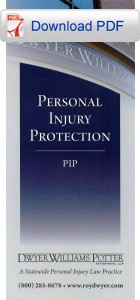Oregon’s Mandatory Personal Injury Protection (PIP)
Personal Injury Protection, commonly called “PI”P, is included by law in all Oregon automobile insurance policies. PIP provides payment for medical bills, lost wages, certain household expenses, and funeral expenses.
 If you are driving or riding in your own car, then usually your own auto insurance company pays your PIP benefits. If you are riding in someone else’s car, then usually their insurance company will pay the PIP benefits. Sometimes PIP benefits are available even if you are not in a car. For example, if you are a pedestrian or bicyclist, you may still have PIP benefits under your own or the other party’s car insurance. Unfortunately, the law does not require motorcycle policies to carry PIP coverage, and most motorcycle policies do not include this coverage.
If you are driving or riding in your own car, then usually your own auto insurance company pays your PIP benefits. If you are riding in someone else’s car, then usually their insurance company will pay the PIP benefits. Sometimes PIP benefits are available even if you are not in a car. For example, if you are a pedestrian or bicyclist, you may still have PIP benefits under your own or the other party’s car insurance. Unfortunately, the law does not require motorcycle policies to carry PIP coverage, and most motorcycle policies do not include this coverage.
PIP benefits are available to you whether or not the accident was your fault. There is no penalty to you for making a PIP claim under your own policy. However, your insurance company is entitled to be reimbursed by the responsible person’s insurance company.
What Medical Expenses are Covered?
PIP covers all reasonable and necessary medical and dental expenses that your doctor says are related to the accident. This can include doctor bills, dental bills, chiropractor bills, emergency room bills, ambulance bills, physical therapy bills and prescriptions. PIP will not pay for mileage to and from medical appointments. By law, PIP must cover at least $15,000 worth of medical expenses occurring within 365 days of the accident.
Your date of treatment, not the date you were billed, determines whether or not PIP must pay the bill. The PIP policy may provide higher limits and longer time periods. Occasionally, PIP may have a $250 deductible, but this is uncommon.
What Wage Loss is Reimbursable?
If your doctor instructs you to remain off work for at least 14 days, you are entitled to receive a least 75% of your regular wage rate up to a maximum of $1,250 per month. This amount will increase to $3,000 per month for policies issued/renewed on or after January 1, 2010. This coverage is available for up to 52 weeks, and it does not necessarily have to start from the date of the accident. Again, the PIP policy might provide higher benefits. The insurance company responsible for making PIP payments on your behalf will have you fill out a PIP application form. If you get the form directly from your insurance company, you should fill it out as best you can, sign it, and return it to your attorney to review before it is sent to the PIP carrier. After the form is submitted, the insurance company handling the PIP claim will assign an insurance adjuster who will handle all payments. It works best if you turn over all medical bills to you attorney, and let your attorney submit them for payment. On any wage loss claim, you will need a statement from your doctor indicating your disability, and also a note from your employer verifying your employment and your rate of pay. Once your wage claim is established, you should receive time loss checks every two weeks, so long as your doctor continues to verify that you are unable to work. You will need to obtain regular reports or slips from your doctor to verify the ongoing disability
How Do I Apply for PIP Benefits? What Medical Expenses are Covered?
PIP covers all reasonable and necessary medical and dental expenses that your doctor says are related to the accident. This can include doctor bills, dental bills, chiropractor bills, emergency room bills, ambulance bills, physical therapy bills and prescriptions. PIP will not pay for mileage to and from medical appointments.
By law, PIP must cover at least $15,000 worth of medical expenses occurring within 365 days of the accident. Your date of treatment, not the date you were billed, determines whether or not PIP must pay the bill. The PIP policy may provide higher limits and longer time periods. Occasionally, PIP may have a $250 deductible, but this is uncommon. If you are not regularly employed and your doctor says you are disabled for at least 14 days, then you can make a claim for certain expenses you incur in your household because of your disability, such as baby-sitting expenses, housekeeping expenses, or even nursing expenses. This benefit is limited to a maximum of $30 per day and a maximum payment period of 52 weeks, although the PIP policy may be more beneficial than those minimum requirements. Additionally, PIP pays all reasonable and necessary funeral expenses up to a $2,500 limit. The expenses must be incurred within one year of the date of the accident. Again, the policy might provide higher benefits.
What Other Expenses are Covered Under PIP? What About My Losses Not Paid by PIP?
All of your medical bills and lost wages may not be paid by PIP, due to these limitations. PIP is simply a method to help you get by while you are recovering from your injuries without having to wait for settlement or trial before you get any money. If you have medical expenses or wages not covered by PIP, our policy is to make a claim for those items when we attempt to settle the case with the other insurance company.

